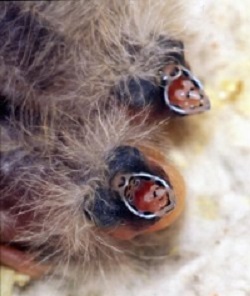By calling to their eggs, zebra finch parents may be helping their young prepare for a hotter world brought on by climate change. Uncovering such a mechanism represents a significant advance in the effort to understand how species are adapting to a warming climate.
“Incubation calling,” paired with the ability of embryos to hear external sounds, is just one of an array of prenatal guidance tools shared by many animal groups.
However, these behaviors’ relation to evolutionary and survival capacities, especially in a rapidly changing environment, are understudied — a gap that Mylene M. Mariette and Katherine L. Buchanan sought to fill by homing in on incubation calling.
Hypothesizing that these calls help the unborn offspring of zebra finches anticipate their new environment, the authors recorded the incubation calls of 61 female and 61 male “wild-derived” zebra finches nesting in outdoor aviaries during naturally changing temperatures.
They observed that finch parents called to their eggs only during the end of the incubation period and only when the maximum temperature rose above 26°Celsius (or 78°Farhenheit).
To test whether this calling behavior specifically prepared offspring for high temperatures, Mariette and Buchanan exposed finch eggs to recorded incubation calls or regular parent contact calls.
When the eggs hatched, the group of nestlings exposed to the former type of call weighed less than control birds. Though a smaller mass would seem disadvantageous, the authors showed that it actually correlated with less oxidative damage — the harmful build-up of unstable molecules in DNA, proteins, and fats — thus arguing that reduced mass may ultimately benefit finch health at stressful higher temperatures.
Corresponding with their prediction, after tracking the nestlings’ maturity, the researchers found that the lower-mass “treatment” finches produced more fledglings in their first breeding season. What’s more, incubation calling may stimulate habits across generations, the authors say, as treatment males preferred to nest in higher-temperature areas than did control males. Mariette and Buchanan’s research takes a lead in gauging the impact of global warming on species’ survival.
Source: Science daily
N.H.Kh

